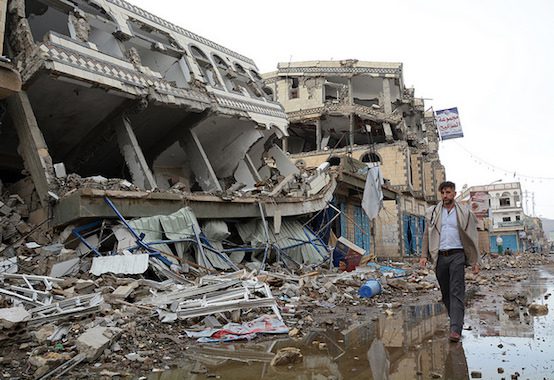The Indefensible U.S.-Backed War on Yemen Continues

Michael Brendan Dougherty sums up the damage caused by the U.S.-backed, Saudi-led war on Yemen:
Consider Saudi Arabia’s unjust war with Yemen, which has become a grotesque humanitarian disaster. American involvement in this war has hardly been acknowledged by our political class, and is barely even known to the public. Understandably, perhaps, people want to look away from what is happening: With the help and connivance of the British and American governments, Saudi Arabia has been deliberately starving the country of Yemen, a nation unusually dependent on food imports.
The UN reported this week that nearly 14 million people, half of Yemen’s population, are suffering a food “crisis” or “emergency.” The next classification after emergency is “famine.” The UN’s efforts at relieving the hunger of Yemen reach just 3.5 million Yemeni people, and even this project is desperately underfunded. Beyond the starvation conditions, Saudi-led airstrikes have knocked over humanitarian relief resources in Yemen, and just this week killed another eight innocents in a single strike.
The situation will soon be even worse than this. As I’ve mentioned before, the U.N.’s food program will shortly be out of money. A new report confirms that this week:
Khoury said in an interview on Wednesday that without more funding, ‘we don’t have enough money to feed even these people’.
The WFP would need about $US200 million ($A268 million) to keep its food distribution at current levels in the coming months, he said.
UN agencies requested $US1.8 billion in overall aid for Yemen in 2016, but only 20 per cent of that money has arrived, Khoury said.
Losing that aid will obviously make the humanitarian catastrophe in Yemen even worse than it already is. It can’t be emphasized enough that the Saudi-led blockade is mostly responsible for depriving the population of basic necessities, and it has been doing so for the last fifteen months. The near-famine conditions in Yemen today are a man-made disaster, and the Saudis and their allies bear the largest share of responsibility for it. This is what the U.S. is supporting in order to “reassure” a clutch of despots of our commitment to them.
Dougherty asks the obvious questions:
Why is this mission valuable to the U.S.? Why are we participating, despite repeated warnings that it is a humanitarian disaster?
What kind of friendship requires something so transparently wicked?
I suspect that one of the reasons that U.S. involvement in the war on Yemen receives so little attention is that there are no good answers to any of these questions, and so people prefer to avoid the subject. The Saudi-led intervention has been indefensible, and almost no one even tries to defend it. But because very few politicians are willing to criticize the Saudis publicly, almost everyone shrugs and accepts what the U.S. has been helping them to do.
U.S. support for the war on Yemen is an especially disgusting example of the tendency to give reflexive backing to the actions of client states. That tendency regularly implicates the U.S. in the wrongdoing of these states, creates new enemies, and strengthens existing resentments against us. Backing the Saudi-led war is morally abhorrent and one of the worst foreign policy decisions of this century, and it is also one of the more needlessly stupid things that our government has done in my lifetime.
Support for the war on Yemen exemplifies many of the worst aspects of our foreign policy. It is remarkably cynical, completely divorced from any identifiable American interest, driven by a misguided desire to please reckless clients, and senselessly cruel to a nation of people that has never done anything to us. I would like to think that most Americans would be appalled by this if they fully understood what was happening and the U.S. role in it, but that would require a lot more than the very limited coverage that the war has received so far.
Comments